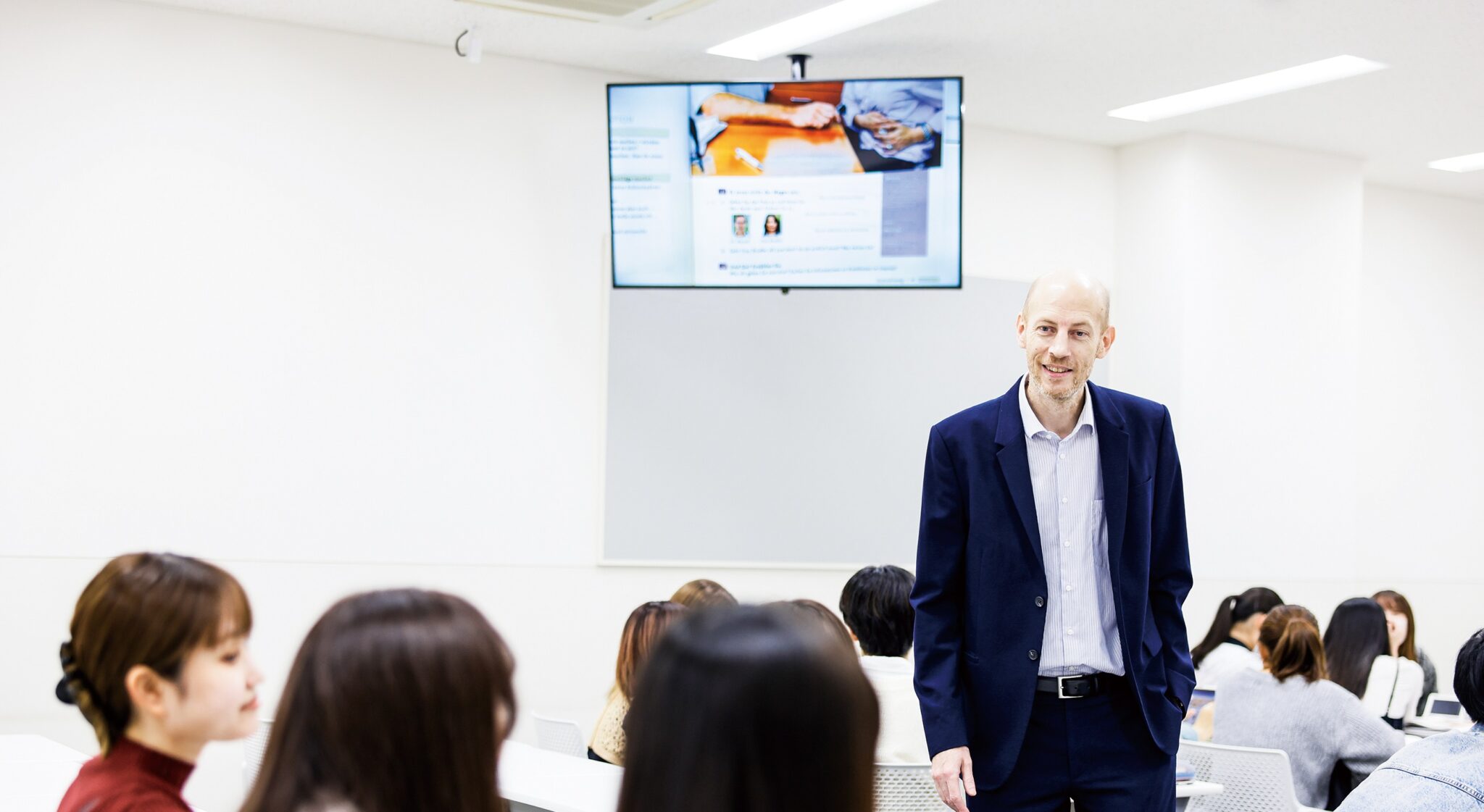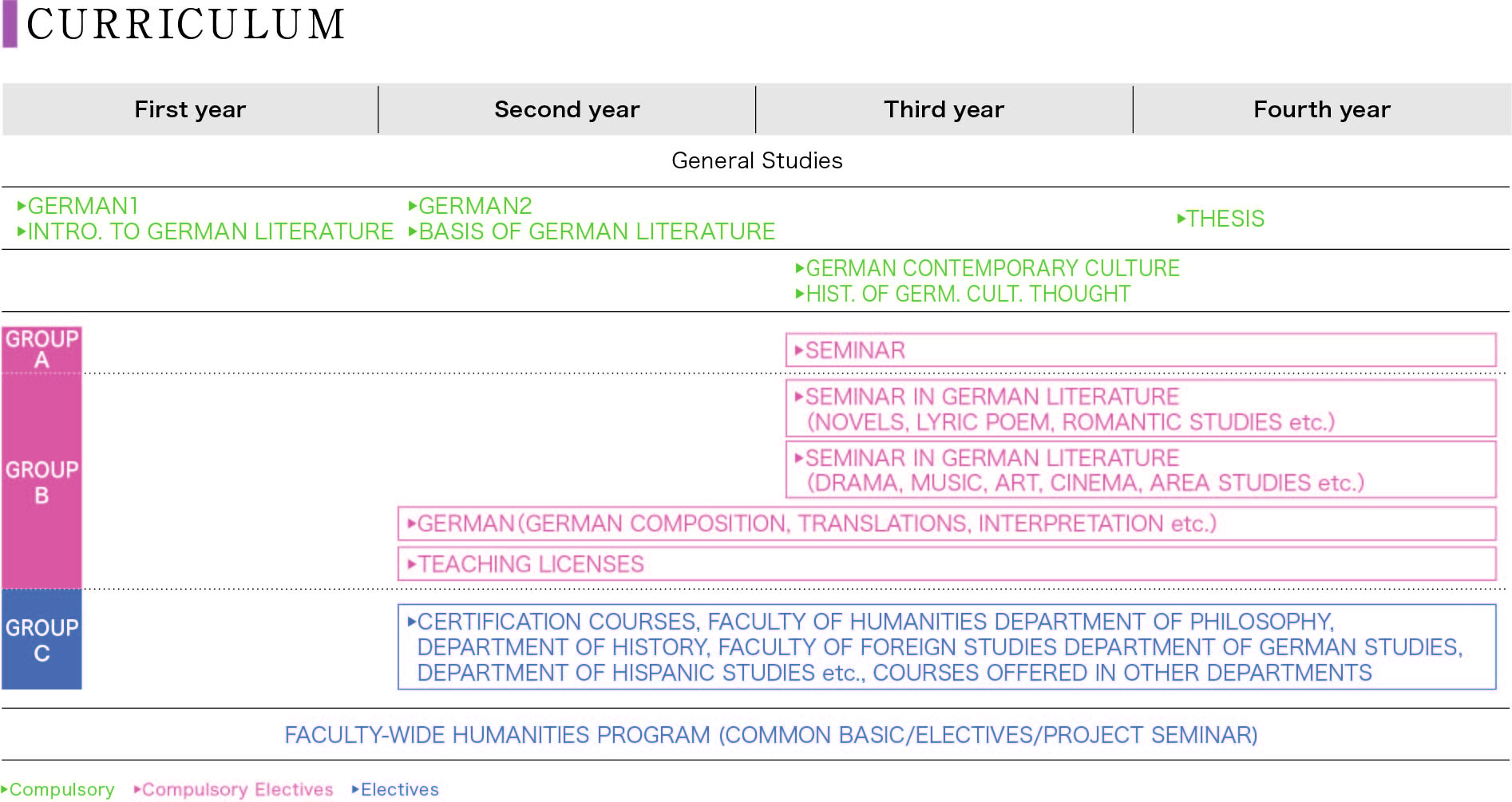Department of German Literature


Department Features
Students will study the literature and culture of German-speaking countries while acquiring comprehensive German language skills. Through specialized courses, students will deepen their understanding of the diverse and complex history and culture of central Europe, including Germany, Austria, and Switzerland, while developing the logical thinking skills required to analyze and interpret literary and artistic works, and imagination skills necessary for reading texts. The examination of different cultures will also provide an opportunity to question the state of Japan and ourselves today.
The Department of German Literature aims to cultivate flexible and wise insights into the world and people, by exploring Western culture from its underlying language, to nurture individuals who have acquired the ability to empathize with others and express themselves.
Curriculum
In the first and second years, students acquire basic German language skills in reading, listening, writing, and speaking. At the same time, they learn about German culture and ideas through introductory courses in German literature and literary studies. In the fall semester of the second year, up to five students may take prescribed courses at the University of Düsseldorf, Germany.
In the third and fourth years, students read literary works in the “Literature Exercise” in Group A, and in Group B, they study the literature, art, and language of German-speaking countries systematically and multilaterally, focusing on a variety of works. In the fourth year, students apply their language skills and knowledge of German literature and culture to their graduation research.
as of 2022
* Please refer to the syllabus for more information on the courses.
Course Examples
- Introduction to German Literature
Divided into the medieval period to the first half of the 19th century and the early 19th century to the present day (post-Romanticism), the course traces the flow of German language literature in light of the social and ideological background of Europe as a whole, while touching on many literary works.
- Basis of German Literature
Students will acquire the skills necessary to conduct research on German literature and culture, including the ability to think critically, search for and use sources, techniques for interpreting texts, and methods for writing research papers. Students will also give oral presentations and write papers on the results of their independent research.
- History of German Cultural Thought
The course traces the evolution of culture and thought in German-speaking countries, focusing on the lives of historical figures and their influence. Students will also study various cultural phenomena such as philosophy, literature, art, and music in concrete terms under the supervision of native speakers.
- Seminar
Students will read a variety of literary works in German, including poems, novels, plays, and essays, to appreciate their richness of expression. Students will also learn about the historical and cultural background of the works and explore the possibilities of interpreting them in a seminar format.
- Series of German Culture Research
Students will study the arts outside of literature, such as theater, music, fine arts, and film, as well as Swiss and Austrian history and culture, and Japanese-German comparative cultural theory. Through this group of courses, students will be exposed to the diversity and depth of German-speaking cultures
- Research Series in German Language
Students will improve their practical German language skills through exercises such as conversation and writing. Students will deepen their cross-cultural understanding through the practical study of translation, interpretation, and other forms of inter-lingual exchange.
Available Teaching Licenses and Subjects
- First Category Teaching license for Junior High School (German)
- First Category Teaching license for High School (German)
Curatorial courses are available.
Educational Objectives and Policies
-
To develop comprehensive proficiency in the German language, and to cultivate a capacity to examine Germanic literature, thought, art, music, and other themes in their historical and cultural context.
-
To use broad-ranging investigation of Germanic literature and culture to cultivate graduates with pluralistic outlooks, versatile judgment, and advanced skills of linguistic expression.
-
With an aim to foster human resources with the following qualities through acquiring German language skills and studying American and European literature and culture, with a focus on those of the German-speaking world, the Department of German Literature sets standards for the skills and knowledge students should acquire before graduation as follows. Those who fulfill the graduation requirements shall be deemed to have acquired these qualities and will be awarded a diploma.
1. The ability to engage in complex conversation broadly ranging from daily conversation to academic debate based on empathy for German speakers by acquiring comprehensive German language skills (reading, listening, speaking, writing).
2. The ability to appropriately understand the contents and meaning of various text from modern and past times using the rich imagination and logical and creative thinking skills fostered through research and appreciation of the arts, including literature, fine arts and music
3. The ability to independently discover and analytically observe issues and research themes in various times, regions and cultural phenomena. Also, the ability to clearly express the acquired knowledge or views in German or Japanese.
4. The ability to acknowledge the diversity and richness of the world from a “plurilinguistic” perspective gained in the acquisition of German and English and to observe the past and future of humans from a multidimensional viewpoint.
5. The ability to contribute to enhanced mutual understanding and cultural exchange between one’s home country and European countries or the US based on broad and profound knowledge of the culture of the German-speaking world and an open mind towards others nurtured through understanding cultures and ideologies different from their own along with their historical and social backgrounds.
-
In accordance with the Diploma Policy, with an aim to develop and promote the qualities and abilities that will contribute to mutual exchange among different cultures, and with a focus of acquiring German and conducting research on the culture of the German-speaking world, the Department of German Literature constructs its curriculum as follows:
1. During the freshman and sophomore years, have students proactively join small-group language classes that are offered based on collaboration between Japanese and foreign faculty members with an aim to have students acquire general and practical German language proficiency (speaking, reading, writing) skills
2. During the freshman year, have students acquire general knowledge of the language, history, and arts of the German-speaking world and the methodology for cultural studies, as well as offer a category of courses that aim to foster an awareness of challenges in human sciences studies
3. During the junior and senior years, have students deepen academic knowledge through diverse lectures and seminars on literature and various arts of the German-speaking world and advanced German classes, as well as foster critical analytic skills, general judgment and practical communication skills
4. During the senior year, have students compile a thesis in Japanese or German, based on individualized consultations with the advisor, with an aim to acquire academically excellent logical composition skills as a culmination of the cultural research methodologies and knowledge acquired during enrollment
5. Seek acquisition of an overall perspective of local and other histories, societies and cultures and achievement of deeper mutual understanding through comparative studies of Japanese and German culture, the Faculty of Humanities cross-disciplinary program, taking courses offered by other Faculties and Departments, and study abroad to universities in the German-speaking world
-
The Department of German Literature welcomes students who fully understand and respect the
founding philosophy of Sophia University and bear the qualities described below:1. Students highly interested in the literature, arts, thought, history, etc. of German-speaking countries who are capable of continuously engaging in studies driven by self-motivation, and making tireless efforts to acquire the German language proficiency required to study these different disciplines
2. Inquisitive students in high pursuit of novel knowledge and experiences associated with different cultures who are flexible and open-minded, and capable of expressing their opinions in a logical and persuasive manner
3. Students who are strongly motivated to contribute to the deepening of mutual understanding and cooperation between German-speaking countries and their home country, with a multidimensional perspective toward modern society, an imagination that helps their understanding of “others” as well as openness and respect for “others”
Faculty Members
Yuri KOMATSUBARA Professor
Yu TAKAHASHI Professor
Reiko MIWA Professor
Christopher SCHELLETTER Assistant Professor
